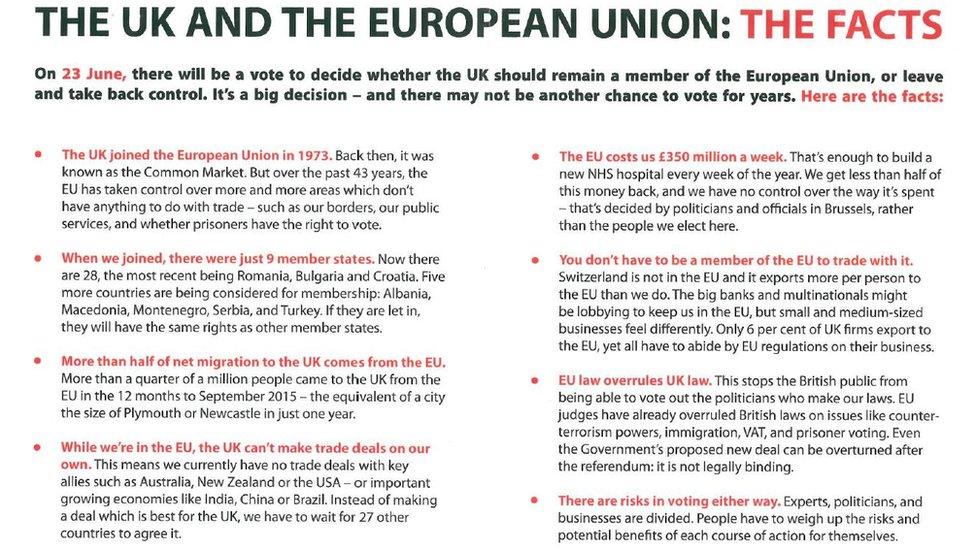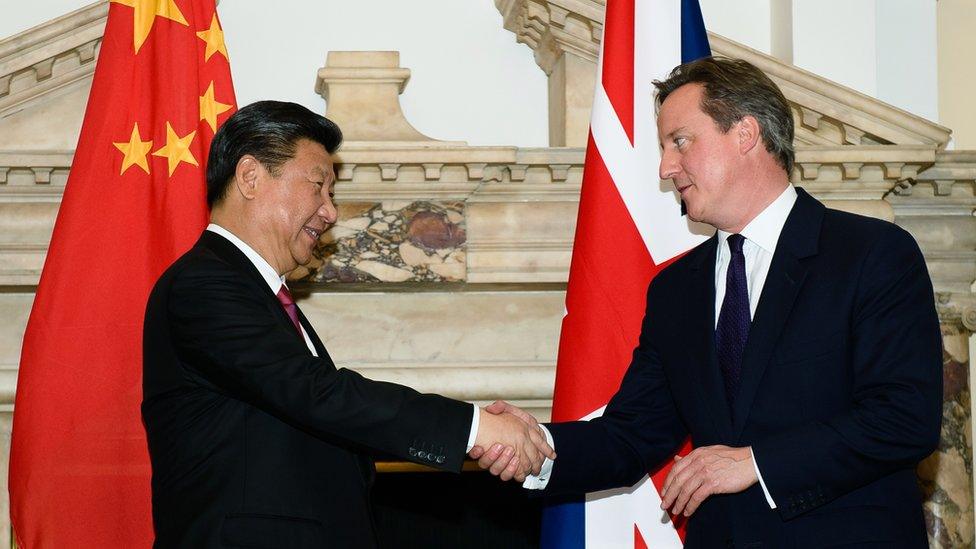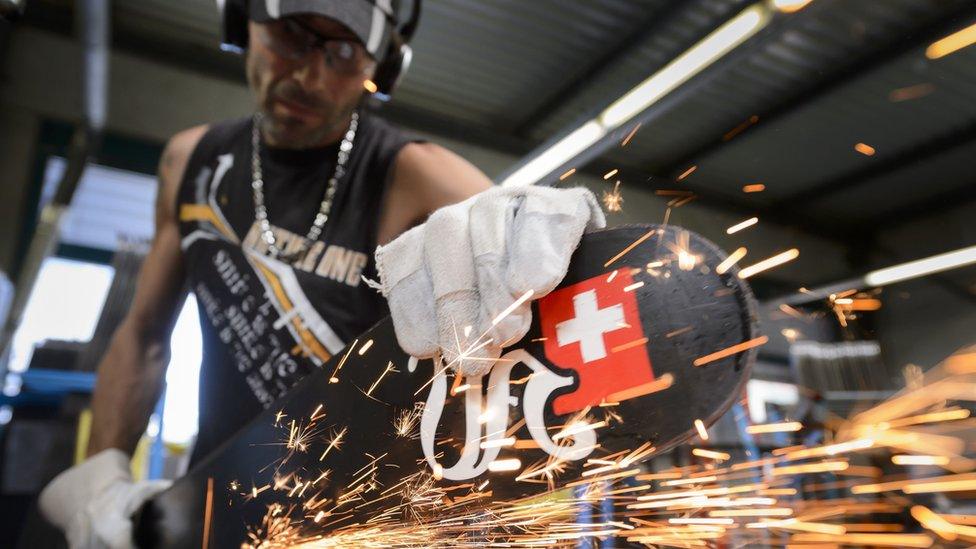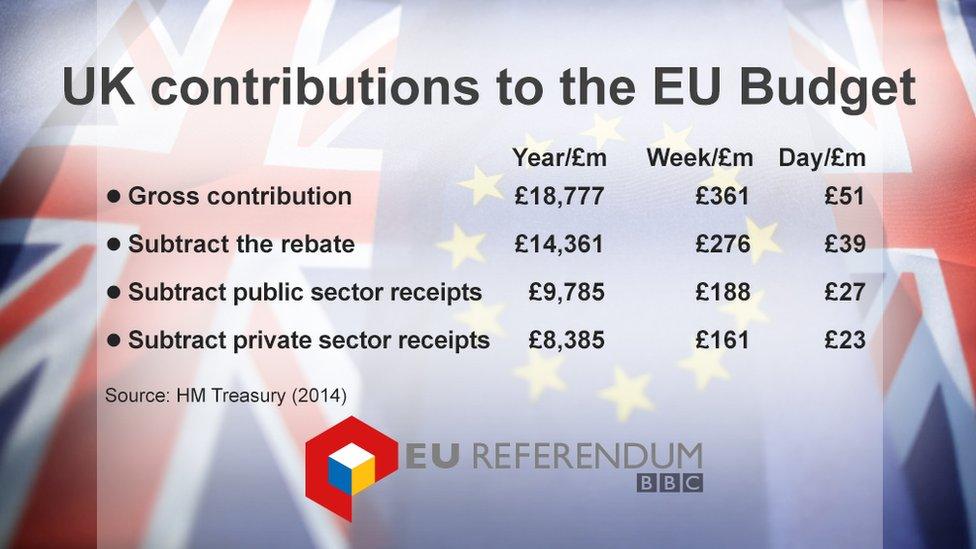Reality Check: Checking the Vote Leave leaflet
- Published

Vote Leave has sent out a leaflet called "The UK and the European Union: The Facts".
It is not immediately obvious that it comes from Vote Leave, which is not mentioned until right at the end of the small print on the back.
The claim: "Over the past 43 years, the EU has taken control over more and more areas which don't have anything to do with trade - such as our borders, our public services and whether prisoners have the right to vote."
The EU is certainly doing more than it did when it started in 1973.
On the specific claims, though, citizens of EU member states are free to live and work in the UK, but the EU does not control our borders. The UK is not signed up to the Schengen Agreement, so everybody crossing UK borders has to show a passport.
Border staff can bar entry to anyone, but they will need an extremely good reason to exclude anyone who holds a passport issued by an EU member state. Criminal convictions are not a good enough reason. We've looked at the issue in more detail here.
The EU does not control how much we spend on, or what our priorities are, for public services such as the NHS, schools, community services or libraries. The UK government decides on those issues.
Most of the cases against the UK on whether prisoners have the right to vote have involved the European Court of Human Rights, which is not an EU institution. Leaving the EU would make no difference to the UK's status at the European Court of Human Rights.
The European Court of Justice, which is an EU institution, has also been involved, but at the moment prisoners in the UK are still not allowed to vote. The UK government may be sued in the future as a result of the ruling though.
Reality Check verdict: The EU does not control borders, public services and has not yet managed to control prisoner voting.
The claim: "Five more countries are being considered for membership: Albania, Macedonia, Montenegro, Serbia and Turkey. If they are let in they will have the same rights as other member states."
They would not have the same rights straight away. Under current EU rules, EU member states may restrict the freedom of movement of the citizens of new members for seven years. For example, Romania and Bulgaria joined in 2007 but did not get the same rights as other members until 2014.
But all new members, once accepted, would have full rights in due course.
It is worth noting that none of these countries is likely to join in the foreseeable future though, and any current member can veto their joining. For example, Turkey has progressed the furthest along the road to membership of any of these five, and still has a long long way to go.
Reality Check verdict: Those five countries are indeed candidate countries and if they do join they will have equal rights after seven years of membership under the current rules.
The claim: "More than half of net migration comes from the EU. More than a quarter of a million people came to the UK from the EU in the 12 months to September 2015."
Net migration (that's the number who have come minus the number who have left) in the year to September was about 323,000, of which 172,000 were coming from or going to EU countries, so that is indeed more than half, although there is a pretty big margin of error on these figures.
Also, it's a bit misleading, because a net 191,000 people came from outside the EU. The reason that EU plus non-EU does not add up to the net migration figure is because a net 40,000 British people left the UK.
The next figure is not net migration, it's just people coming from EU countries, which was 257,000 in the year to September. The net figure is lower because about 85,000 people left the UK for EU countries in the same period.
Reality Check verdict: The claim is true, but the quarter of a million people is not the net figure - 85,000 people left.

The claim: "While we're in the EU, the UK can't make trade deals on our own. This means we currently have no trade deals with key allies such as Australia, New Zealand or the USA - or important growing economies like India, China or Brazil."
Reality Check verdict: The UK is indeed not allowed to negotiate its own comprehensive trade deals involving abolishing tariffs or reducing barriers to trade. This does not stop it signing trade deals such as the billions of pounds of trade deals signed between the UK and China.
The claim: "The EU costs us £350m a week. That's enough to build a new NHS hospital every week of the year. We get less than half of this money back and we have no control over the way it's spent - that's decided by politicians and officials in Brussels, rather than the people we elect here."
Reality check has already looked at the cost of EU membership
Of that weekly spend (it's actually £361m a week) £85m comes back to the UK as the rebate secured by Margaret Thatcher, so we certainly control how that is spent.
Then there is money that comes back to the UK to support public and private sector schemes, which leaves £161m, meaning we have got more of the original sum back.
Of that remaining money, we still have some control, because, for example, we get to elect our own delegates to the European Parliament.
Reality Check verdict: We get more than half of the gross contribution back and we have some control over all of it.

The claim: "You don't have to be a member of the EU to trade with it. Switzerland is not in the EU and it exports more per person to the EU than we do."
Swiss exports to the EU were worth €162bn (£130bn) in 2014 for a population of 8 million.
The UK's were worth £227bn for a population of 64 million. On a per capita basis, Switzerland's exports are considerably higher.
But Switzerland has a deal with the EU, which means it has to accept free movement of people and pay a contribution to the EU budget.
Reality Check verdict: The Swiss do trade more per person with the EU, but it has to accept freedom of movement and contribute to the EU Budget.
The claim: Only 6% of UK firms export to the EU, yet all have to abide by EU regulations on their business
Vote Leave has drawn on a report by Business for Britain, external, which looked at the number of VAT registered companies who submit what are called EC sales lists to the government.
It's mostly larger companies that export goods and services, whereas the majority of companies are small and aren't involved in international trade.
Reality Check verdict: Precise figures for the number of exporters to the EU aren't available, but this estimate looks to be in the right ballpark.
The claim: "EU law overrules UK law. This stops the British public from being able to vote out the politicians who make our laws. EU judges have already overruled British laws on issues like counter-terrorism powers, immigration, VAT and prisoner voting. Even the Government's proposed new deal can be overturned after the referendum: it is not legally binding."
New EU laws must be agreed by the EU Council, which is made up of the member states' government ministers and the European Parliament. So British people can vote out some of the politicians who make laws - the UK government and British MEPs - but not those from other countries.
Many of the times that UK judges have been overruled were in the European Court of Human Rights, which is not an EU institution, but the government has also been defeated in the European Court of Justice, which is part of the EU.
On the issue of whether the new deal could be rejected, Reality Check has looked at this question before. In principle, the agreement is subject to a legal challenge, but it's very unlikely to be thrown out because it's an agreement of all 28 member states.
Reality Check verdict: EU law does overrule UK law but we can vote out some of the politicians involved.
The claim: "There are risks in voting either way. Experts, politicians, and businesses are divided. People have to weigh up the risks and potential benefits of each course of action for themselves."
Reality Check verdict: This is a fair point. Nobody can be certain exactly what the future will be like, whether we stay in the EU or leave.


READ MORE: The facts behind claims in the EU debate

- Published22 February 2016

- Published24 March 2016

- Published5 April 2016
